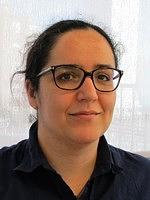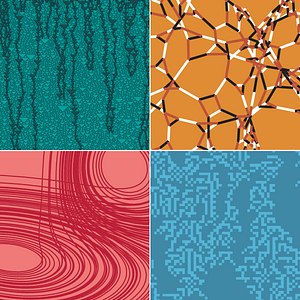- About the Course:
Probability and statistics have long helped scientists make sense of data about the natural world — to find meaningful signals in the noise. But classical statistics prove a little threadbare in today’s landscape of large datasets, which are driving new insights in disciplines ranging from biology to ecology to economics. It's as true in biology, with the advent of genome sequencing, as it is in astronomy, with telescope surveys charting the entire sky.
The data have changed. Maybe it's time our data analysis tools did, too.
During this three-month online course, starting June 11th, instructors Hector Zenil and Narsis Kiani will introduce students to concepts from the exciting new field of Algorithm Information Dynamics to search for solutions to fundamental questions about causality — that is, why a particular set of circumstances lead to a particular outcome.
Algorithmic Information Dynamics (or Algorithmic Dynamics in short) is a new type of discrete calculus based on computer programming to study causation by generating mechanistic models to help find first principles of physical phenomena building up the next generation of machine learning.
The course covers key aspects from graph theory and network science, information theory, dynamical systems and algorithmic complexity. It will venture into ongoing research in fundamental science and its applications to behavioral, evolutionary and molecular biology.
Prerequisites:
Students should have basic knowledge of college-level math or physics, though optional sessions will help students with more technical concepts. Basic computer programming skills are also desirable, though not required. The course does not require students to adopt any particular programming language for the Wolfram Language will be mostly used and the instructors will share a lot of code written in this language that student will be able to use, study and exploit for their own purposes.
Course Outline:
- The course will begin with a conceptual overview of the field.
- Then it will review foundational theories like basic concepts of statistics and probability, notions of computability and algorithmic complexity, and brief introductions to graph theory and dynamical systems.
- Finally, the course explores new measures and tools related to reprogramming artificial and biological systems. It will showcase the tools and framework in applications to systems biology, genetic networks and cognition by way of behavioral sequences.
- Students will be able apply the tools to their own data and problems. The instructors will explain in detail how to do this, and will provide all the tools and code to do so.
The course runs 11 June through 15 September 2018.
Tuition is $50 required to get to the course material during the course and a certificate at the end but is is free to watch and if no fee is paid materials will not be available until the course closes. Donations are highly encouraged and appreciated in support for SFI's ComplexityExplorer to continue offering new courses (instructors have no share from your donation).
In addition to all course materials tuition includes:
- Six-month access to the Wolfram|One platform (potentially renewable by other six) worth 150 to 300 USD.
- Free digital copy of the course textbook to be published by Cambridge University Press (worth around 40 USD).
- Several gifts will be given away to the top students finishing the course, check the FAQ page for more details.
Best final projects will be invited to expand their results and submit them to the journal Complex Systems, the first journal in the field founded by Stephen Wolfram in 1987.
- About the Instructor(s):
 Hector Zenil has a PhD in Computer Science from the University of Lille 1 and a PhD in Philosophy and Epistemology from the Pantheon-Sorbonne University of Paris. He co-leads the Algorithmic Dynamics Lab at the Science for Life Laboratory (SciLifeLab), Unit of Computational Medicine, Center for Molecular Medicine at the Karolinska Institute in Stockholm, Sweden. He is also the head of the Algorithmic Nature Group at LABoRES, the Paris-based lab that started the Online Algorithmic Complexity Calculator and the Human Randomness Perception and Generation Project. Previously, he was a Research Associate at the Behavioural and Evolutionary Theory Lab at the Department of Computer Science at the University of Sheffield in the UK before joining the Department of Computer Science, University of Oxford as a faculty member and senior researcher.
Hector Zenil has a PhD in Computer Science from the University of Lille 1 and a PhD in Philosophy and Epistemology from the Pantheon-Sorbonne University of Paris. He co-leads the Algorithmic Dynamics Lab at the Science for Life Laboratory (SciLifeLab), Unit of Computational Medicine, Center for Molecular Medicine at the Karolinska Institute in Stockholm, Sweden. He is also the head of the Algorithmic Nature Group at LABoRES, the Paris-based lab that started the Online Algorithmic Complexity Calculator and the Human Randomness Perception and Generation Project. Previously, he was a Research Associate at the Behavioural and Evolutionary Theory Lab at the Department of Computer Science at the University of Sheffield in the UK before joining the Department of Computer Science, University of Oxford as a faculty member and senior researcher. Narsis Kiani has a PhD in Mathematics and has been a postdoctoral researcher at Dresden University of Technology and at the University of Heidelberg in Germany. She has been a VINNOVA Marie Curie Fellow and Assistant Professor in Sweden. She co-leads the Algorithmic Dynamics Lab at the Science for Life Laboratory (SciLifeLab), Unit of Computational Medicine, Center for Molecular Medicine at the Karolinska Institute in Stockholm, Sweden. Narsis is also a member of the Algorithmic Nature Group, LABoRES.
Narsis Kiani has a PhD in Mathematics and has been a postdoctoral researcher at Dresden University of Technology and at the University of Heidelberg in Germany. She has been a VINNOVA Marie Curie Fellow and Assistant Professor in Sweden. She co-leads the Algorithmic Dynamics Lab at the Science for Life Laboratory (SciLifeLab), Unit of Computational Medicine, Center for Molecular Medicine at the Karolinska Institute in Stockholm, Sweden. Narsis is also a member of the Algorithmic Nature Group, LABoRES.Hector and Narsis are the leaders of the Algorithmic Dynamics Lab at the Unit of Computational Medicine at Karolinska Institute.
- Course Team:
TA: Alyssa Adams has a PhD in Physics from Arizona State University and studies what makes living systems different from non-living ones. She currently works at Veda Data Solutions as a data scientist and researcher in social complex systems that are represented by large datasets. She completed an internship at Microsoft Research, Cambridge, UK studying machine learning agents in Minecraft, which is an excellent arena for simple and advanced tasks related to living and social activity. Alyssa is also a member of the Algorithmic Nature Group, LABoRES.
Alyssa Adams has a PhD in Physics from Arizona State University and studies what makes living systems different from non-living ones. She currently works at Veda Data Solutions as a data scientist and researcher in social complex systems that are represented by large datasets. She completed an internship at Microsoft Research, Cambridge, UK studying machine learning agents in Minecraft, which is an excellent arena for simple and advanced tasks related to living and social activity. Alyssa is also a member of the Algorithmic Nature Group, LABoRES.The development of the course and material offered has been supported by:
- The Foundational Questions Institute (FQXi)
- Wolfram Research
- John Templeton Foundation
- Santa Fe Institute
- Swedish Research Council (Vetenskapsrådet)
- Algorithmic Nature Group, LABoRES for the Natural and Digital Sciences
- Living Systems Lab, King Abdullah University of Science and Technology.
- Department of Computer Science, Oxford University
- Cambridge University Press
- London Mathematical Society
- Springer Verlag
- ItBit for the Natural and Computational Sciences and, of course,
- the Algorithmic Dynamics lab, Unit of Computational Medicine, SciLifeLab, Center for Molecular Medicine, The Karolinska Institute
- Class Introduction:
- Class Introduction
- How to use Complexity Explorer:
- How to use Complexity Explorer
- Enrolled students:
-
1,241
- Course dates:
-
12 Jun 2018 4am UTC to
13 Oct 2018 5am UTC - Prerequisites:
- Like this course?
- Donate to help fund more like it
- Twitter link
- Follow Course on Twitter
Syllabus
- A Computational Approach to Causality
- A Brief Introduction to Graph Theory and Biological Networks
- Elements of Information Theory and Computability
- Randomness and Algorithmic Complexity
- Introduction to Dynamical Systems
- Algorithmic Information Dynamics and Reprogrammability
- Applications to Behavioural, Evolutionary and Molecular Biology, and Machine Learning
- Final Exam
